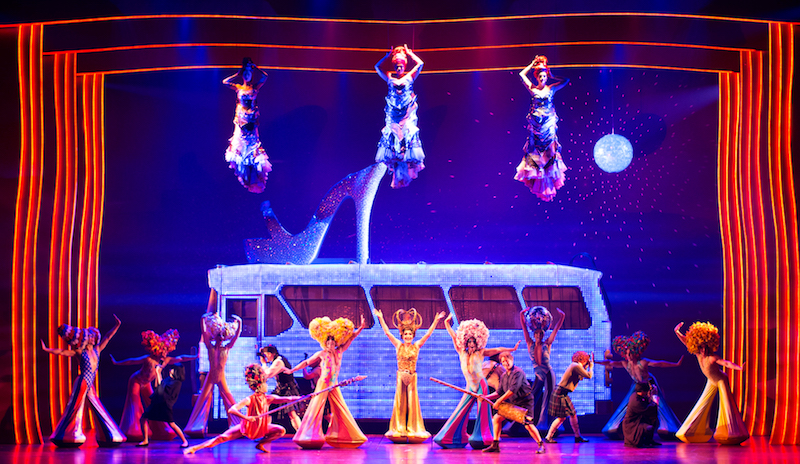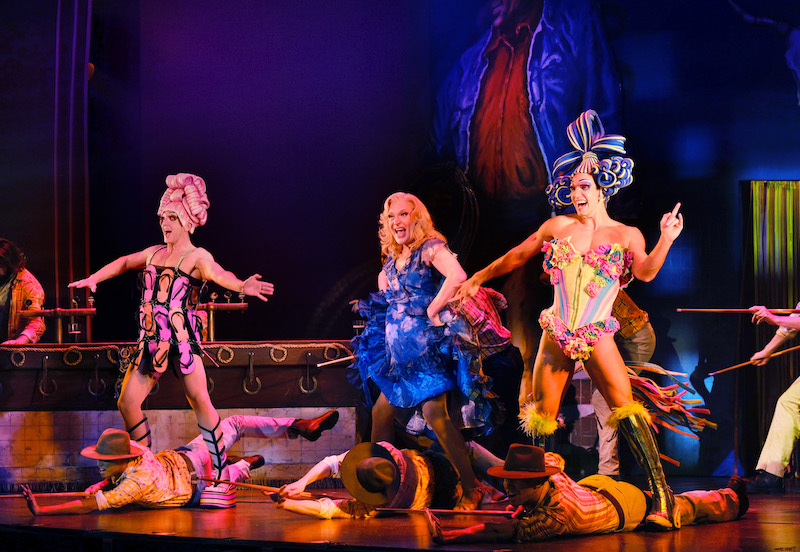Sydney’s Capitol Theatre is a glorious monument to excess, with its night-sky ceiling, intricate mouldings and classical statuary in alcoves lining the walls. Naturally it’s perfect for Priscilla Queen of the Desert – The Musical, back in the city where it premiered 10 years ago. (Even the statues dressed up for opening night, sporting pink feather boas.)
Priscilla arrives back on the Australian scene after a decade of world travel that’s taken in Broadway and the West End as well as countries as far-flung as Israel, Brazil, Japan and South Africa, among many others. There’s even a cruise-ship version that’s going gang-busters. Obviously the show has universal appeal and yet it is entirely, emphatically Australian. Part of a movement, almost.
It’s impossible to think about Priscilla (both the musical and the 1994 film that spawned it) without also thinking about its near kin, 1992’s Strictly Ballroom and 1994’s Muriel’s Wedding, which opened in Australian cinemas just three weeks before Priscilla. All three are a hymn to raucous humour, retina-burning colours and flamboyant personalities. They’re big and messy and far from perfect but that’s part of the charm. Rough edges are good. They offset the sweetness and add a homespun feel to pieces that flirt endlessly with the fantastical. It’s a tricky mix, actually, where the chance of failure is high.

Crucially, in each of the three popular music isn’t just a soundtrack, it’s integral to the action. It’s no surprise therefore that each has been adapted for the musical theatre stage. Muriel premiered in Sydney last year and is to return next year, the heavily reworked Strictly opened on the West End last month, and Priscilla is now in Sydney after starting its 10thanniversary tour in Melbourne in January, produced by the Michael Cassel Group and Nullarbor Productions.
So far, so fabulous. But best of all is that beneath their off-beat surface each is so very, very life-enhancing. The people in these narratives, outsiders all, seek the light instead of succumbing to the dark. They don’t deny that life can be cruel and they don’t run away from a fight, but they deal with it and move on. Some may think this kind of optimism isn’t useful or even possible, or that it’s just sentimental nonsense. And yet, more than a quarter of a century on these stories and these characters still resonate. To borrow from Strictly Ballroom, it would seem audiences are still moved by the idea that a life lived in fear is a life half-lived.
Priscilla has been tinkered with over the years but is still essentially the show Simon Phillips originally directed, with assists more recently from Associate Director Dean Bryant. The book was co-written by the film’s writer and director Stephan Elliott (with Allan Scott) and takes the film’s broad outline as a starting point. It then ramps the fantasy factor up to 15 on a scale of 10.
Tick, whose show name is Mitzi (David Harris) has been invited to perform his drag act in Alice Springs. He asks fellow artists Adam, aka Felicia (Euan Doidge), and Bernadette (Tony Sheldon), a trans woman, to join him on the long journey from Sydney to the Centre. A bus is procured and christened Priscilla, and off they trot on an outback road trip full of adventure, smart-arse repartee and brushes with danger. Also coming along for the ride: a vast wardrobe of stunning stage attire. Tim Chappel and Lizzy Gardiner’s costumes are, as they were from day one, peerless.
The production is otherwise on a slightly smaller scale than it once was – it’s a bit deflating to find the majesty of Uluru impersonated by a wash of red light on a bare stage – but is serviceable enough. Happily there are still the flying divas (Angelique Cassimatis, Samm Hagen and Cle Morgan), who sing their socks off while whizzing high above the action and, of course, designer Brian Thomson’s titular bus. There is no show without Priscilla.
 David Harris, Tony Sheldon and Euan Doidge. Photograph © Ben Symons
David Harris, Tony Sheldon and Euan Doidge. Photograph © Ben Symons
Absolutely central to proceedings is the return of Tony Sheldon as Bernadette, a role he played first in Sydney and then in London and New York. It has brought him the international career he so richly deserves. Sheldon’s Bernadette is warm, wise and wise-cracking, but one never loses sight of the deep-seated courage she has had to draw on as a trans woman, nor the pain she keeps damped down. It’s a beautiful performance, overflowing with witty touches.
Harris attractively plays Tick as straight man, if you’ll excuse the expression, to Doidge’s crazy-brave Adam, all mouth and no impulse control. Robert Grubb is the salt-of-the-earth Bob whose generous, non-judgmental spirit keeps the bus in working order and gives Bernadette a shot at happiness. Xion Jarvis (he shares the role with three other boys) was delightful on opening night as Benji, the son who needs to be part of Tick’s life.
One could argue that the early Tick-Benji scene in which they sing Burt Bacharach and Hal David’s I Say a Little Prayer is perilously close to mawkishness but Harris and Jarvis sang it touchingly. Mostly, though, the songs are there to get the blood pumping and the memories rolling back the years. There’s something for everyone really, from disco to pop to opera to country, most of it the excuse for yet another bout of high-energy dancing (choreography by the late Ross Coleman and Andrew Hallsworth). It must be mayhem backstage as the cast changes costume with each new song but the results are spectacular for all concerned, including especially the men of the ensemble, as buffed and waxed as a fleet of new Ferraris. The camp-o-meter is off the wall, which isn’t a criticism.
In Susan Sontag’s marvellous 1964 essay Notes on Camp, she wrote that the “hallmark of Camp is a spirit of extravagance”, and also cited the embrace of artifice, aesthetics, theatricality, passion, playfulness and “the attempt to do something extraordinary”. I think we can see Priscilla fitting in there nicely. Beneath its shiny exterior beats a huge, lovable heart. Its fundamental thesis is that family is important and you find it where you can. It revels in difference and asks for tolerance and understanding – all the while laughing, singing and dancing.
Deborah Jones is the Sydney music theatre critic for The Australian, which reviewed the show in Melbourne
Priscilla plays in Sydney until July 22 then tours to Adelaide and Brisbane
TICKETS











Comments
Log in to join the conversation.